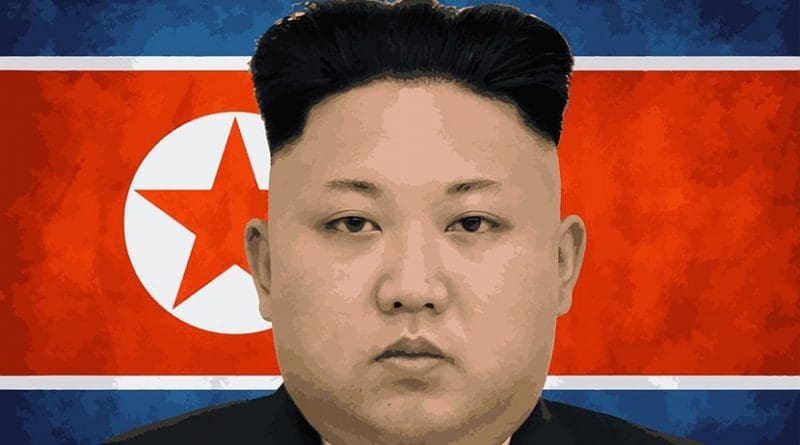Is North Korea Entering A Dangerous New Period Of Brinkmanship? – Analysis
By Marcus Noland*
On September 24, the South Korean government announced that a government official had been killed by North Korean forces near the maritime border between the two countries, his body burned and dumped into the sea. The official was thought to be attempting to defect, and the North Koreans apparently feared coronavirus infection. While the horrifying particulars could not be foreseen, the notion that North Korea would engage in low-level provocations in the run-up to the US election was entirely predictable. What remains to be seen is whether the magnitude of provocations will dramatically grow after a new US administration takes office in January.
Pandemic fallout in the North
In the past nine months, COVID-19 appears to have accomplished what economic sanctions could not, namely isolate North Korea from the rest of the world. On January 21, North Korea closed its border with China with which it did 90 percent of its official trade, and was also the country’s primary source of investment and tourist arrivals.
Prices of food and other essentials rose, and became divergent across geographic locations. Shortages of chemicals, fertilizer, and fuel adversely affected agriculture, which was further worsened by the impact of flooding and a typhoon.
In mid-April the government announced a ban on the use of foreign exchange for domestic transactions (US dollars or Chinese yuan are used for most large value transactions), and announced a massive issuance of government bonds, the first in 17 years. But this was not just a normal bond issuance: bond purchase was described as a “patriotic duty.” One mine operator, who declined to do the patriotic thing and accept the new government bond as payment for his minerals in lieu of cash, was reportedly executed.
The value of the currency in the black market grew volatile, as citizens, fearing expropriation, dumped their foreign exchange to purchase physical goods such as jewelry, consumer durables, and even food, as a store of value.
In short, North Korea is under multiple stresses, all of which could be made worse if a second COVID-19 wave emerges. Yet the distress has not forced the North Koreans to capitulate on the nuclear issue or even return to the negotiating table. This is, after all, the country that in the 1990s lost perhaps one million people in a famine—and did not experience a leadership change.
State of play with the US
For the United States, denuclearization remains the primary goal, but there is no broad agreement internationally on exactly what that means. The US has a state goal of verifiable denuclearization of the peninsula, but other countries have signaled a willingness to consider a less complete freeze on future development and production of nuclear weapons.
The North Koreans believe that they were stiffed at the February 2019 Hanoi Summit when President Trump abruptly walked out, and no one really knows what they want in exchange for their nuclear weapons program.
Diplomacy is dead in the water: Trump administration policy is erratic, careening between a hardline “maximum pressure” approach and President Trump’s on-again, off-again bromance with North Korean leader Kim Jong-un. China and South Korea fear instability more than nuclear arms in North Korea, and so will not allow the North to be pushed to the wall. The Trump Administration has alienated allies and a kind of “sanctions fatigue” has set in as countries look for ways of discreetly working around existing United Nations sanctions. In South Korea, the government of President Moon Jae-in would like to move forward with greater engagement but is constrained by US opposition.
Brinksmanship could escalate after US election
The North Koreans have long practiced brinkmanship in negotiations. It was predictable that in the run-up to the US election the North would engage in provocations such as short-range missile tests or incursions into the Demilitarized Zone dividing North and South Korea, actions that would raise tensions, but fall short of an ICBM launch or a nuclear weapons test. The killing of the South Korean official falls into this pattern.
But the level of provocation could rise considerably after a new US administration takes office in January. If Donald Trump is re-elected, there is no reason to believe that the basic diplomatic environment will change, and the North Koreans are likely to ramp up the pressure to break the stalemate.
If Joe Biden is elected, the situation is more complicated. An incoming Biden administration will need to do a policy review to form a consensus within the US government on a new approach. But after the last four years, the political and diplomatic agenda confronting the new administration will be daunting, and North Korea will not be at the top of the list. It is quite possible that the North will grow impatient and engage major provocations such as ICBM or nuclear tests to grab the Biden administration’s attention, just as they did to the incoming Obama Administration in 2009. The goal would be to force action before the new government had completed its the policy review and settled on a coherent strategy. The first months of 2021 could be very dangerous indeed.
*About the author: Marcus Noland is a Nonresident Senior Fellow with the East-West Center and Executive Vice President / Director of Studies with the Peterson Institute for International Economics.

